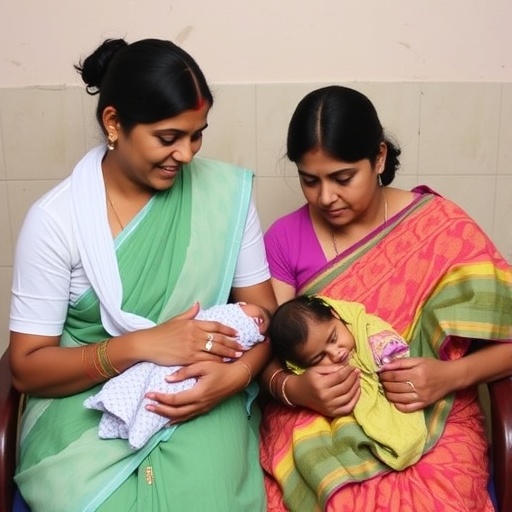In the intricate tapestry of postpartum care in India, the role of family dynamics emerges as a crucial determinant of new mothers’ wellbeing. Recent research analyzing mother-caregiver relationships reveals profound insights into how the identity of a primary support figure after childbirth shapes health and emotional outcomes for Indian women. This study, published in the prestigious journal PLOS One, elucidates the markedly contrasting postpartum experiences of women supported predominantly by their own mothers compared to those primarily cared for by their mothers-in-law, underscoring the complex interplay of cultural, social, and psychological factors inherent in familial caregiving.
The investigation delves into mother-caregiver dyads across various regions of India, engaging with new mothers and the family members entrusted with their postpartum care. Indian childbirth traditions often implicate extended family involvement, especially from elder matriarchs residing within the household or nearby. However, the distinction between receiving support from one’s own mother versus the mother-in-law is not merely a matter of familial preference but one that exerts tangible effects on the mother’s physical recovery and psychological wellbeing during the vulnerable postnatal period.
Quantitative and qualitative data converge to reveal that women whose own mothers take the lead role in their postnatal care consistently report enhanced overall wellness. This improved wellbeing encompasses multiple facets, including reduced stress levels, more effective management of postpartum depression symptoms, and higher satisfaction with their childbirth experience. The maternal bond, forged through shared biological and emotional history, appears to provide a foundation of empathy and understanding that facilitates nurturing, holistic care during this critical period.
Conversely, the study highlights a concerning trend among new mothers who rely predominantly on their mothers-in-law for caregiving. These women often report significantly diminished wellbeing, characterized by greater emotional strain, feelings of alienation, and lower satisfaction with support received. The findings suggest that the caregiving relationship with the mother-in-law may introduce additional psychosocial stressors rooted in cultural expectations, hierarchical family structures, and potential interpersonal conflicts, which can impede the mother’s ability to fully recover and thrive postpartum.
This dichotomy aligns with longstanding socio-cultural practices prevalent in many Indian households, where patrilocal living arrangements often position the mother-in-law as a central figure in managing domestic and childcare duties. While such arrangements ensure continuity of care, they may inadvertently compromise the new mother’s autonomy and amplify tensions, thereby influencing her mental and physical health outcomes adversely. The research emphasizes that beyond mere physical assistance, the quality of emotional support and respect for the mother’s preferences are vital components of effective postpartum care.
Methodologically, the study employed a robust mixed-methods approach, combining structured interviews, psychological wellbeing assessments, and observational data collection. This comprehensive framework enabled researchers to capture not only measurable health outcomes but also nuanced interpersonal dynamics within the caregiving context. By centering the mother-caregiver dyad, the research sheds light on the bidirectional influences and challenges that arise in these intimate caregiving relationships.
A key implication emerging from this research is the call for culturally sensitive healthcare policies and interventions that prioritize the mother’s subjective experience and agency during postnatal care. Integrating family members, especially mothers-in-law, into educational programs designed to foster supportive and empathetic caregiving environments could mitigate potential conflicts and improve health trajectories for new mothers. Such initiatives require nuanced understanding and navigation of entrenched cultural norms alongside contemporary health imperatives.
Moreover, the findings challenge healthcare practitioners and policymakers to rethink standardized postpartum care models in India, which often overlook familial caregiving realities. Embedding community-based support systems that recognize the differential roles and influences of various family caregivers can optimize resource allocation and tailor interventions to diverse family structures. This approach holds promise for enhancing maternal health outcomes not only in India but potentially in other societies with similar familial configurations.
Importantly, the study reports no specific external funding, indicating an independent research endeavor driven by academic curiosity and public health imperatives rather than vested interests. The demographic and geographic diversity of the study population adds strength to the generalizability of the findings within the Indian context, although the authors suggest further longitudinal research to explore long-term postpartum trajectories influenced by caregiver identity.
This pioneering research invites deeper reflection on how postpartum care is conceptualized and operationalized within multicultural and multigenerational households. By emphasizing the pivotal role of the mother’s own mother in fostering postpartum wellness, it champions a more individualized and empathetic framework for caring for new mothers. As maternal health continues to garner global attention, particularly in low- and middle-income countries, these insights offer a valuable roadmap for designing supportive, effective, and culturally congruent postpartum care programs.
In conclusion, the nuanced investigation of family-member roles in Indian postnatal care reveals that the source of caregiving support significantly influences maternal wellbeing outcomes. Women cared for primarily by their own mothers experience notably better health and emotional recovery than those whose primary supporters are mothers-in-law. Recognizing and addressing these familial dynamics can profoundly impact postpartum care practices, fostering healthier, more resilient mothers and families. This research marks a critical step toward optimizing maternal health within India’s rich cultural fabric and resonates with broader global efforts to enhance perinatal care through culturally attuned, evidence-based strategies.
Subject of Research: The influence of family caregivers on postpartum wellbeing among new mothers in India, focusing on mother-caregiver dyads and the differential impact of support from mothers versus mothers-in-law.
Article Title: Investigating the role of family members in postnatal care: Evidence from mother-caregiver dyads in India
News Publication Date: 10-Sep-2025
Web References: http://dx.doi.org/10.1371/journal.pone.0327986
Image Credits: Noora Health, CC-BY 4.0
Keywords: Postpartum care, maternal wellbeing, family caregiving, mother-caregiver dyads, India, maternal health, cultural dynamics, mother-in-law, maternal support, postpartum recovery




